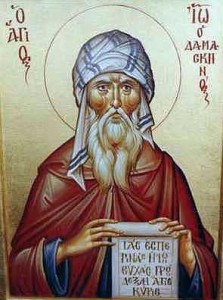A friend of mine has been encouraging me to put something together on this for a church publication. I wanted to write so much more (e.g. presenting more of the patristic work on the subject), but time and space didn’t allow for it. I am guessing that some of the audience will find the title provocative. But a spade is a spade and almost always takes the hand (and denial of Christ is always wrong and, without repentance and mercy, always gets set). Anyways, here’s a draft of the article for your consideration. (First published here in 2011).
 One God. The Muslims are “radical monotheists”. They believe that there are other spiritual beings (e.g. the angels and djinn), but explicitly deny the Trinity; “They do blaspheme who say: Allah is one of three in a Trinity: for there is no god except One Allah.” (Koran 5:73a). So while they recognize that there is only one God and that He is the creator and sovereign over all things, they are missing the salvific truth about Christ and the Holy Spirit. Muslims often reach out to Christians by sharing their respect for Jesus, but they only recognize his role as a great miracle-working prophet; Islam refers to Jesus as the Messiah and confirms his virgin birth, but it denies His divinity, His death on the cross, and His resurrection (e.g. Koran 5:72b). Presaging anti-Christian scholars like Prof. Bart Ehrman, Muslims claim that the leaders of the Christian Church made up these things about Jesus and modified scripture to support their claims.
One God. The Muslims are “radical monotheists”. They believe that there are other spiritual beings (e.g. the angels and djinn), but explicitly deny the Trinity; “They do blaspheme who say: Allah is one of three in a Trinity: for there is no god except One Allah.” (Koran 5:73a). So while they recognize that there is only one God and that He is the creator and sovereign over all things, they are missing the salvific truth about Christ and the Holy Spirit. Muslims often reach out to Christians by sharing their respect for Jesus, but they only recognize his role as a great miracle-working prophet; Islam refers to Jesus as the Messiah and confirms his virgin birth, but it denies His divinity, His death on the cross, and His resurrection (e.g. Koran 5:72b). Presaging anti-Christian scholars like Prof. Bart Ehrman, Muslims claim that the leaders of the Christian Church made up these things about Jesus and modified scripture to support their claims.
I really like your summation of the differences between Orthodoxy and Islam here. I’ve never lived in a majority-Orthodox country, but I have lived in Saudi Arabia for a while and I think that what you’ve written here is very fair. I had a friend whose children learned Koran excerpts by memory- the kids didn’t understand what they were memorizing. I like the way that you explain their view of the Koran as a ‘perfect’ document.
It may be useful to add that Mohammed is characterized by temporal power. He was a prophet, and a warlord, but he was also a banker/ merchant. “Trifecta.” My understanding is that for Muslims, any true and successful prophet will embody this “trifecta”. Sort of like the old Protestant idea that God’s grace is indicated through prosperity. To my mind, this is an important point because it shows a fundamental difference between Muslim and Christian world views.